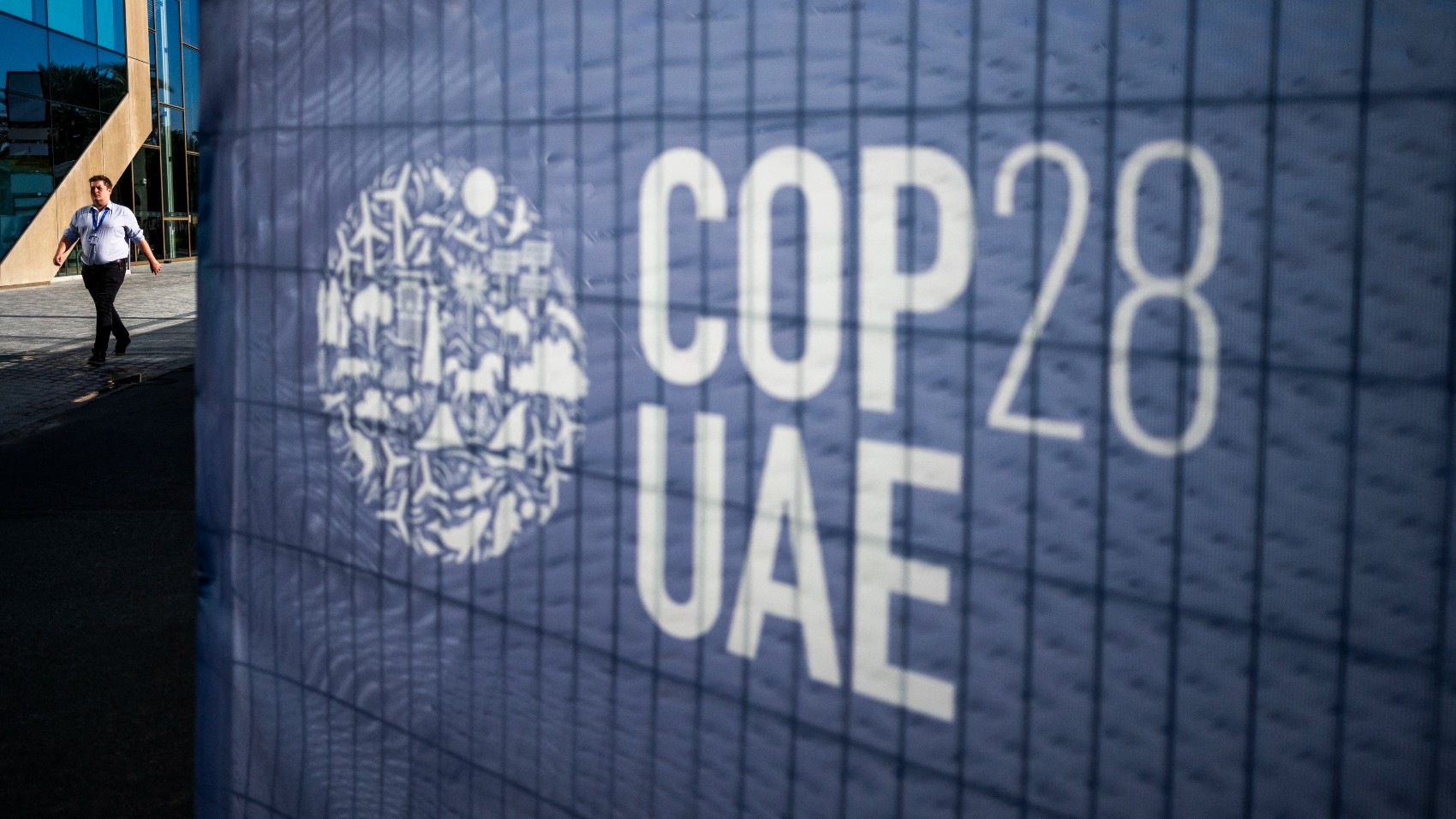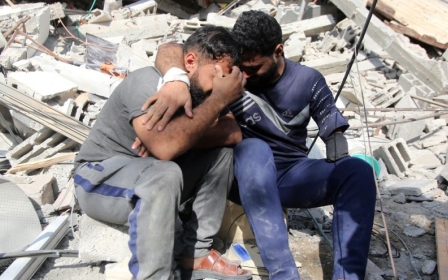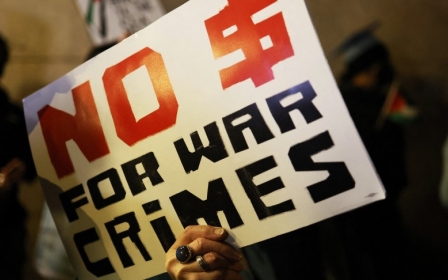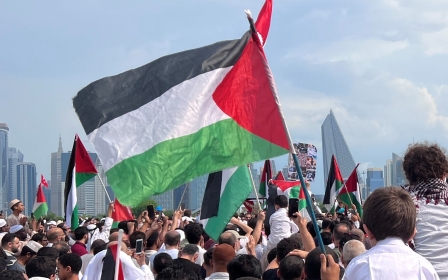Cop28: 'Eco-normalisation' goes ahead in Dubai despite Israeli war crimes

The 28th UN climate summit, Cop28, opened on Thursday in Dubai, hosting delegations of the 198 parties to the United Nations Framework Convention on Climate Change.
In the months and weeks leading up to the conference, controversy and backlash have been cast over the appointment of Sultan al-Jaber, chief executive of the Abu Dhabi National Oil Company (Adnoc), as the head of Cop28. The backlash increased a few days before Cop28 was set to begin when leaked documents revealed the UAE’s intent to use meetings at the event to promote its national oil and gas companies.
But outrage at the Dubai-based climate conference should not only be driven by the hypocrisy of the UAE on climate issues. The UAE has also played a leading role in normalising and strengthening Israel’s political and diplomatic position in the Arab region despite the atrocities perpetrated against the Palestinian people.
New MEE newsletter: Jerusalem Dispatch
Sign up to get the latest insights and analysis on Israel-Palestine, alongside Turkey Unpacked and other MEE newsletters
Since 7 October, Israeli forces have killed more than 15,000 people, including over 6,150 children and injured about 36,000 others. In the same period, Israeli military and settler violence have killed at least 239 people in the West Bank, making 2023 the deadliest year for Palestinians in decades.
Despite Palestinian calls on the international community to hold Israel accountable for its murderous campaign - in addition to its mass starvation and dehydration of Palestinian families in Gaza - which rights groups have asserted amount to war crimes and genocide, the UAE has welcomed Israel to take part in Cop28.
A smaller Israeli delegation than the one initially planned is participating in the conference and will erect a pavilion in the Blue Zone in Dubai. Gideon Behar, the Israeli special envoy for climate change and sustainability, has recently announced that Dubai "helped the delegation both in terms of last-minute changes it had to make and helping to ensure security".
'Eco-normalisation'
In 2020, Israel, the UAE, Bahrain, Morocco and Sudan signed the Abraham Accords, a US-brokered normalisation deal that also seeks to reinforce, formally and informally, existing relations with other Arab states. In the last two years, under the deal, Israel and these Arab states have signed several memoranda of understanding (MoUs) to jointly implement environmental projects concerning renewable energy, agri-business, and water.
In a chapter featured in the recently published book, Dismantling Green Colonialism: Energy and Climate Justice in the Arab Region, I discuss how Arab-Israeli environmental projects are a form of "eco-normalisation" that reinforces Israel’s greenwashing efforts of its settler-colonial oppression.
Follow Middle East Eye's live coverage for the latest on the Israel-Palestine war
The UAE leads and takes part in various projects of eco-normalisation with the Israeli state.
Every year, Israel sees in Cop an important opportunity to reinforce its greenwashing strategy, a way to normalise and deflect attention from the oppression its apartheid settler colonial regime inflicts on the Palestinian people and the resulting environmental injustices. The signing of the Abraham Accords has increased the significance of the conference for Israel, as it has become a space to strike eco-normalisation deals with other Arab states.
The signing of the Abraham Accords has increased the significance of Cop for Israel as it has become a space to strike eco-normalisation deals with other Arab states
Last year, the Israeli Ministry of Foreign Affairs described Cop27, which was convened in Sharm el-Sheikh in Egypt, as "the most significant participation since international conferences on the topic began". It was the year in which Israel built its first national pavilion at the event, promoting 10 climate tech companies and hosting more than 30 events.
Another achievement for Israel at Cop27 was signing a UAE-brokered memorandum of understanding (MoU) with Jordan to continue a feasibility study on two interlinked projects, called Prosperity Blue and Prosperity Green, which together constitute Project Prosperity.
According to the terms of the agreement, Jordan will buy 200 million cubic metres of water annually from an Israeli water desalination plant, which will be established on the Mediterranean coast (Prosperity Blue). The water desalination plant will be powered by a 600-megawatt (MW) solar photovoltaic station to be constructed in Jordan (Prosperity Green) by Masdar, a UAE state-owned renewable energy company.
In June 2023 and in preparation for Cop28, al-Jaber met with Israeli Energy Minister Israel Katz, as well as Jordanian and US officials in the UAE, to advance talks about Project Prosperity. The planned ratification of the trilateral agreement at Cop28 was disrupted on 16 November when Ayman Safadi, Jordan’s foreign minister, announced that Jordan would not proceed with the signing of the agreement.
Safadi explained that Israel’s massacring of Palestinians, including children in Gaza, was the reason for his country’s decision. However, no official announcements have been made by him about the termination of the agreement.
Other eco-normalisation projects between Israel and the Arab states - including a renewable energy project - remain intact despite international and regional outcry over Israeli war crimes in Gaza. Enlight Green and NewMed Energy, two Israeli companies deeply complicit in Israeli apartheid, are set to implement this project in the UAE, Jordan, Bahrain, Morocco, Egypt, Oman, and Saudi Arabia.
Palestine is a climate justice issue
Israel’s ability to carry out mass dehydration and starvation of the 2.3 million Palestinians living in the Gaza Strip as a weapon of warfare underlies decades-long Israeli undermining of Palestinians’ right to food and water sovereignty.
The establishment of Israel on 78 percent of historic Palestine and the forcible expulsion of 750,000 people during the Nakba, or "catastrophe" to Palestinians, marks the start of ongoing Israeli exploitation and degradation of Palestinian land and natural resources.
In addition to Israeli policies of land grabs and usurpation of natural resources, Israel practices climate apartheid against the Palestinian people in the occupied Palestinian Territories. Israel treats Palestinian communities in the West Bank as sacrifice zones for its most hazardous waste. In fact, as rights groups have documented, Israel’s most polluting industries have been moved to the West Bank, raising health and environmental concerns.
The systematic Israeli targeting of civilian infrastructure in the Gaza Strip has resulted in catastrophic environmental damages. Israeli environmental injustices have rendered the Palestinian people incapable of mitigating the hazards of the climate crisis, which also affects their resilience and resistance to Israel’s settler colonial dispossession.
Eco-normalisation relations with Israel reinforce its greenwashing efforts to deflect attention from its ethnic cleansing policies and practices against the Palestinian people and the destruction of their ecosystems.
The greenwashing narrative constructed around energy and water projects between Israel and Arab states like Project Prosperity deceptively posits Israel as a moral environmental steward. By giving space to Israel in Dubai at Cop28 to promote a green image of itself, the UAE (and the rest of the Arab states that have normalised relations) are complicit in undermining the Palestinian people’s quest for freedom, self-determination, and social and climate justice.
There is an increasing recognition of Israeli greenwashing and environmental injustices among young climate activists like Greta Thunberg, who, in a protest in Amsterdam on 12 November chanted, "No climate justice on occupied land".
In protest against the UAE’s deep complicity with apartheid Israel, I have recently rejected an invitation to present my perspective to grassroots groups participating in the climate summit.
My stance echoes the Palestinian Boycott, Divestment and Sanctions (BDS) movement’s call for a full boycott of the Cop28 due to UAE-Israeli normalisation, the country’s track record of human rights abuses, exploitation of immigrant workers, and accusations of war crimes in Yemen.
The views expressed in this article belong to the author and do not necessarily reflect the editorial policy of Middle East Eye.
This article is available in French on Middle East Eye French edition.
Middle East Eye delivers independent and unrivalled coverage and analysis of the Middle East, North Africa and beyond. To learn more about republishing this content and the associated fees, please fill out this form. More about MEE can be found here.





